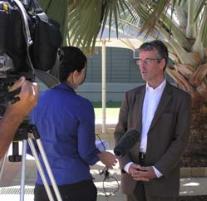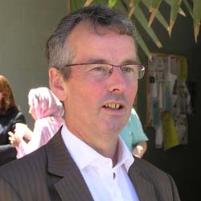Meningococcal B vaccine development discussed
Published on 15 September, 2006
Distinguished visitor Dr Loek van Alphen (pictured), product manager meningococcal and pneumococcal vaccines at the Netherlands Vaccine Institute (NVI), has delivered a presentation on vaccine developments, video-linked from CQU Rockhampton to other regional campuses.
The presentation was given on Monday, September 18.
The event was organised by the Faculty of Sciences, Engineering and Health, together with the Capricornia Centre for Mucosal Immunology at Central Queensland University.
 Video streaming links will be available following the lecture for those not able to attend.
Video streaming links will be available following the lecture for those not able to attend.
Dr van Alphen is a leading world authority in the field of vaccine development for upper respiratory tract bacterial pathogens. He begun his research in the 1970s with a PhD from Utrecht University (Netherlands) on the structure and function of bacterial outer membrane components.
Over the next 2 decades he focused on the epidemiology and pathogenesis of systemic and mucosal infections by Haemophilus influenzae bacteria (meningitis, chronic bronchitis).
In 1997 he became head of the Laboratory for Vaccine Research at the National Institute for Public Health and the Environment (RIVM) and project leader for the R & D program of a multivalent meningococcal B vaccine.
Since 2003 he has been product manager for meningococcal and pneumococcal vaccines of the Netherlands Vaccine Institute (NVI). As product manager he is responsible for all vaccine value chain activities, covering research, development, clinical trials, registration, delivery and procurement.
The seminar covered issues including how a vaccine is developed and how it works; steps leading to the commercialisation of a vaccine; what makes a successful vaccine; and challenges of vaccine development.
This seminar covered these issues in the context of developing a much-needed Meningococcal B vaccine.
Meningococcal B infections can kill within 24 hours. It is not uncommon yet there is no current vaccine.
 Current vaccine strategy against the principal causative bacteria of meningitis (inflammation of the meningitides section of the brain), Neisseria meningitides, protects against disease caused by 4 of the 5 serogroups - A, C, Y, and W of the bacterium. It does not protect against the less immunogenic B strain, the strain that causes the majority of fatal cases.
Current vaccine strategy against the principal causative bacteria of meningitis (inflammation of the meningitides section of the brain), Neisseria meningitides, protects against disease caused by 4 of the 5 serogroups - A, C, Y, and W of the bacterium. It does not protect against the less immunogenic B strain, the strain that causes the majority of fatal cases.
The vaccine team led by Dr van Alphen is particularly interested in developing a vaccine that covers all strains of the bacteria, and strain B in particular. This would reduce the number of cases of sudden and often fatal meningitis cases. Such a vaccine is very challenging to develop and some of the reasons why were discussed.
Dr van Alphen spoke to ABC Radio and WIN Television during his visit, stressing that a strain B vaccine is still around 5 years away from being available.

